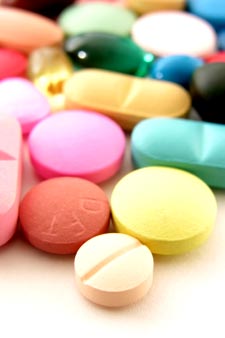|
|
Each capsule contains
Composition
Lincomycine Hydrochloride
..............................................500 mg
I.P equivalent to Lincomycin
base....................................500 mg
Indications
Lincomycin has been used in the treatment of serious skin
infections caused by susceptible strains of streptococci,
pneumococci, and staphylococci.
Description and Clinical Pharmacology
The mode of action of lincomycin is the inhibition of protein
synthesis by the inhibition of the binding of aminoacyl sRNA to
the messenger ribosome complex at the 50S ribosomal unit.
Lincomycin is absorbed rapidly after oral administration, reaching
peak levels in 2 to 4 hours. Levels above the minimum inhibitory
concentration for most gram-positive organisms are maintained for
6 to 8 hours. I.M. administration of lincomycin produces peak
serum levels in 30 minutes with detectable levels persisting for
24 hours after a 600 mg dose.
I.V. infusions of lincomycin over a 2 hour interval yield
therapeutic levels for 14 hours.
Precautions
General: Should be used with caution in those patients with a
history of gastrointestinal disease, specifically colitis.
Lincomycin is not indicated for use in the treatment of meningitis
as the levels within the cerebral spinal fluid do not reach an
adequate concentration to combat this infection.
No serious renal or neurologic abnormalities have been reported to
date. No ototoxicity has been demonstrated in any of a large
number of patients treated with lincomycin.
Pregnancy: Limited experience with 322 women receiving lincomycin
orally at a dosage of 500 mg 4 times/day for 7 days during
pregnancy revealed no ill effect in the mother or the fetus. One
hundred and ten of these patients were treated in the first
trimester of pregnancy, 105 in the second trimester and 107 in the
third trimester. All were suffering from cervicitis and/or
vaginitis of bacterial origin in conjunction with their pregnancy.
One hundred and twelve of the children, ages 6 1/2 to 7 1/2 years,
from these patients have been examined and compared with a control
group of 65 children born at the same time in the same hospital.
Lincomycin treatment did not result in any drug related
abnormalities (physical, dental or developmental) when compared
with the control group.
Since safe conditions for the parenteral use of lincomycin in
pregnancy have not been established, its use in such patients
should involve careful consideration of expected benefits and
possible risks.
Lactation: Lincomycin has been reported in breast milk at
concentrations of 0.5 to 2.4 µg/mL.
Patients with Special Diseases and Conditions: The serum half-life
of lincomycin is increased in those patients with impaired renal
or hepatic function. Therefore, consideration should be given to
reducing the frequency of administration in these patients.
Since adequate data are not yet available in patients with
pre-existing endocrine or metabolic diseases, its use in such
patients is not recommended at this time unless special clinical
circumstances so indicate. Efficacy of lincomycin in the
prophylactic treatment of rheumatic fever has not been
established.
Dosage
As per physician’s advice.
Presentations
10 caps.
|



